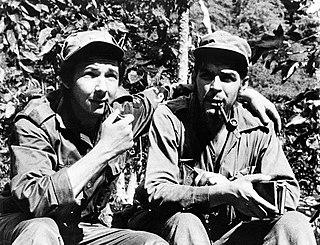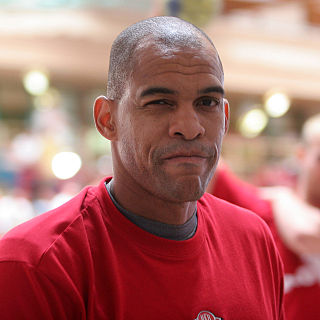
Fulgencio Batista y Zaldívar was a Cuban military officer and politician who served as the elected President of Cuba from 1940 to 1944, and as its U.S.-backed military dictator from 1952 to 1959, before being overthrown during the Cuban Revolution. Batista initially rose to power as part of the 1933 Revolt of the Sergeants, which overthrew the provisional government of Carlos Manuel de Céspedes y Quesada. He then appointed himself chief of the armed forces, with the rank of colonel, and effectively controlled the five-member "pentarchy" that functioned as the collective head of state. He maintained this control through a string of puppet presidents until 1940, when he was himself elected President of Cuba on a populist platform. He then instated the 1940 Constitution of Cuba and served until 1944. After finishing his term he lived in Florida, returning to Cuba to run for president in 1952. Facing certain electoral defeat, he led a military coup against President Carlos Prío Socarrás that preempted the election.

Operation Peter Pan was a clandestine mass exodus of over 14,000 unaccompanied Cuban minors ages 6 to 18 to the United States over a two-year span from 1960 to 1962. They were sent by their parents who were alarmed by rumors circulating amongst Cuban families that the new government under Fidel Castro was planning to terminate parental rights, and place minors in communist indoctrination centers.

The Cuban Revolution was an armed revolt conducted by Fidel Castro's revolutionary 26th of July Movement and its allies against the military dictatorship of Cuban President Fulgencio Batista. The revolution began in July 1953, and continued sporadically until the rebels finally ousted Batista on 31 December 1958, replacing his government. 26 July 1953 is celebrated in Cuba as the Day of the Revolution . The 26th of July Movement later reformed along Marxist-Leninist lines, becoming the Communist Party in October 1965, and the government of Cuba later brought under its guise.

Carlos Juan Finlay was a Cuban epidemiologist recognized as a pioneer in the research of yellow fever, determining that it was transmitted through mosquitoes Aedes aegypti.

Carlos Franqui was a Cuban writer, poet, journalist, art critic, and political activist. After the Fulgencio Batista coup in 1952, he became involved with the 26th of July Movement which was headed by Fidel Castro. Upon the success of the Cuban Revolution in 1959, he was placed in charge of the rebellion's newspaper Revolución, which became an official government publication. When he came to have political differences with the regime, he left Cuba with his family. In 1968 he broke with the Cuban government when he signed a letter condemning the Soviet invasion of Czechoslovakia. He became a vocal critic of the Castro government, writing frequently until his death on April 16, 2010.

Leonardo de la Caridad Padura Fuentes is a Cuban novelist and journalist. As of 2007, he is one of Cuba's best-known writers internationally. In his native Spanish, as well as in English and some other languages, he is often referred to by the shorter form of his name, Leonardo Padura. He has written screenplays, two books of short stories, and a series of detective novels translated into 10 languages. In 2012, Padura was awarded the National Prize for Literature, Cuba's national literary award and the most important award of its kind. In 2015, he was awarded the Premio Principe de Asturias de las Letras of Spain, one of the most important literary prizes in the Spanish-speaking world and usually considered as the Iberoamerican Nobel Prize.
Free Press was an independent book publisher that later became an imprint of Simon & Schuster. It was one of the best-known publishers specializing in serious nonfiction, including path-breaking sociology books of the 1950s, 1960s and 1970s. After a period under new ownership in the 1980s of publishing neoconservative books, it was purchased by Simon & Schuster in 1994. By 2012, the imprint ceased to exist as a distinct entity; however, some books were still being published using the Free Press imprint.

Juan Almeida Bosque was a Cuban politician and one of the original commanders of the insurgent forces in the Cuban Revolution. After the rebels took power in 1959, he was a prominent figure in the Communist Party of Cuba. At the time of his death, he was a Vice-President of the Cuban Council of State and was its third ranking member. He received several decorations, and national and international awards, including the title of "Hero of the Republic of Cuba" and the Order of Máximo Gómez.

Havana’s International Book Fair is an annual public festival to promote Cuban government sanctioned books and writing that spans between February and March. The festival begins in Havana at the Fortaleza de San Carlos de la Cabaña, an 18th-century Spanish construction, and spreads east and west of the capital to all provinces and many municipalities. The book fair ends in the eastern city of Santiago de Cuba. The fair first took place in 1982, and occurred every two years until 2000 when it became an annual tradition. The festival consists of book vendors, poetry readings, children’s activities, art exhibitions, and concerts in the evenings. It is considered Cuba’s premier cultural event, as well as the event with the highest attendance in Havana. The 18th annual International Book Fair in 2009 had approximately 600,000 visitors.

Carlos Alberto Montaner is an exiled Cuban author known for his more than 25 books and thousands of articles, including several novels, the last of which is La mujer del coronel . Some of his books are devoted to explaining the true nature of the Cuban dictatorship, for example: Journey To The Heart of Cuba. PODER magazine has estimated that more than six million readers have access to his weekly columns. He has been published widely in Latin American newspapers, and published fiction and non-fiction books on Latin America. Since 1968 he has had a syndicated weekly column in many newspapers around the world. Montaner is a political analyst for CNN en Espanol and a collaborator on the book, The Cuban Exile, along with well-known Cuban writers Mirta Ojito, award-winning poet and writer Carlos Pintado and Carlos Eire, a book coordinated by Cuban musician and producer Emilio Estefan. In October 2012, Foreign Policy magazine selected Montaner as one of the fifty most influential intellectuals in the Ibero-American world.

Iglesia de Jesús de Miramar is the second largest church in Cuba. It is located in the Roman Catholic Archdiocese of San Cristobal de la Habana.
Carlos M. N. Eire is the T. Lawrason Riggs Professor of History and Religious Studies at Yale University. He is a historian of late medieval and early modern Europe.

Trova is a style of Cuban popular music originating in the 19th century. Trova was created by itinerant musicians known as trovadores who travelled around Cuba's Oriente province, especially Santiago de Cuba, and earned their living by singing and playing the guitar. According to nueva trova musician Noel Nicola, Cuban trovadors sang original songs or songs written by contemporaries, accompanied themselves on guitar, and aimed to feature music that had a poetic sensibility. This definition fits best the singers of boleros, and less well the Afrocubans singing funky sones or even guaguancós and abakuá. It rules out, perhaps unfairly, singers who accompanied themselves on the piano.

Carlos Pérez is a retired Cuban-Hungarian handball player, who played for Veszprém KC and the Hungarian national team. Currently he is the assistant coach of Telekom Veszprém.

Ricardo Porro Hidalgo was a Cuban-born architect. He graduated in architecture from the Universidad de la Habana in 1949 and built this year his first project Villa Armenteros in Havana, following which he spent two years in post-graduate studies at the Institute of Urbanism at the Sorbonne.
The National Book Award for Nonfiction is one of five annual National Book Awards, which are given by the National Book Foundation to recognize outstanding literary work by U.S. citizens. They are awards "by writers to writers". The panelists are five "writers who are known to be doing great work in their genre or field".
Split Decision is filmmaker Brin-Jonathan Butler's cautionary examination of Cuban-American relations, and the economic and cultural paradoxes that have shaped those relations since Fidel Castro's revolution, through personal stories and interviews with the world's most famous contemporary Cuban boxers and international authorities on Cuba.

Nicholas Andrew Basbanes is an American author who writes and lectures widely about authors, books and book culture. His subjects have included the "eternal passion for books" ; the history and future of libraries ; the "willful destruction of books" and the "determined effort to rescue them" ; "the power of the printed word to stir the world" ; the invention of paper and its effect on civilization and an exploration of Longfellow's life and art.

Alberto Yarini y Ponce de León (1882-1910) was a Cuban racketeer and pimp during the period of the Cuban War of Independence against Spain. Yarini was well known in his time, is Cuba's most famous pimp, and came to symbolize the concept of Cubanidad, the Cuban national identity, to many Cubans, long after his death.















